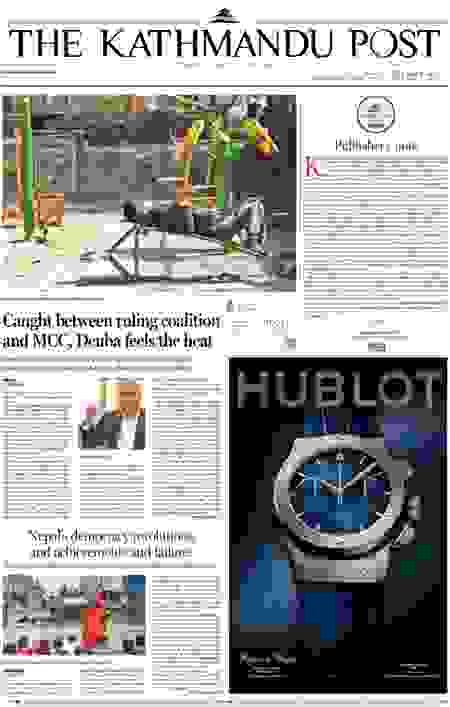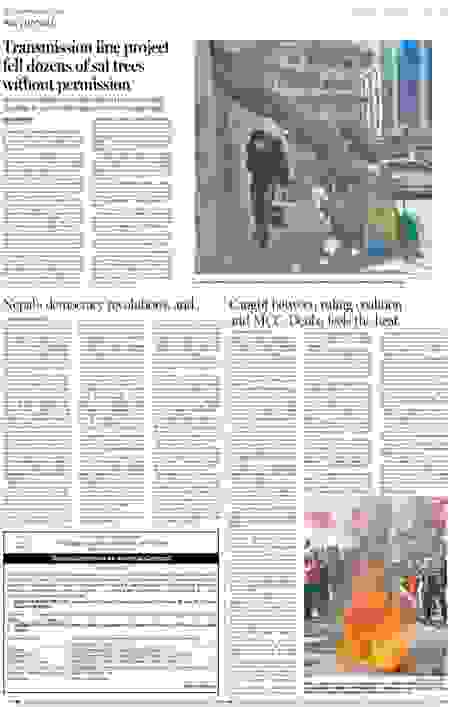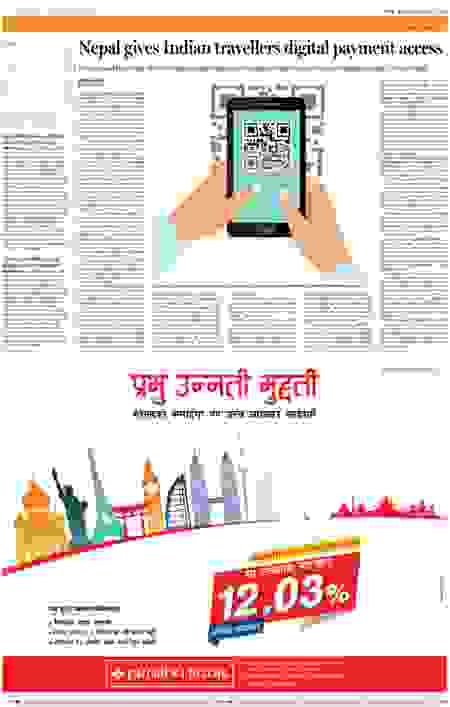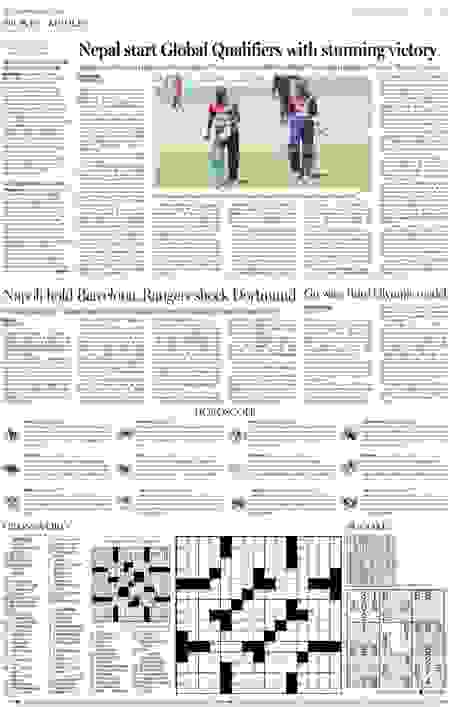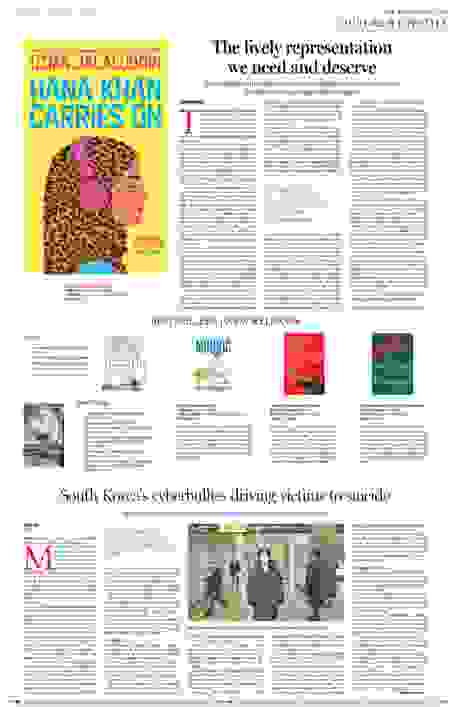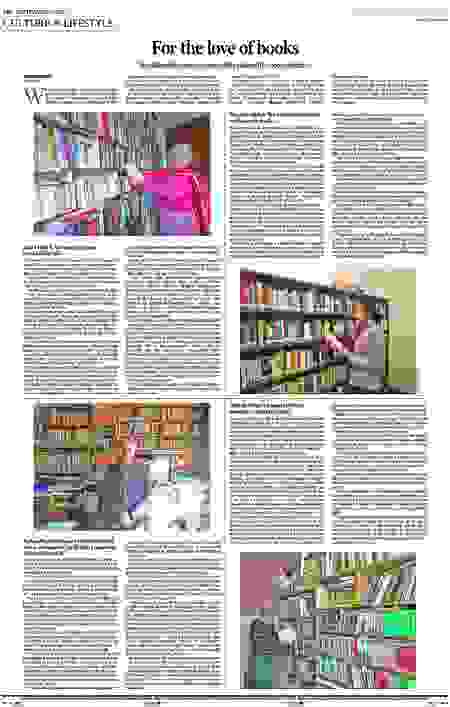Caught between ruling coalition and MCC, Deuba feels the heat

Sher Bahadur Deuba. RSS
KATHMANDU,
Prime Minister Sher Bahadur Deuba appears to have fallen between two stools.
He is under pressure to move the Millennium Challenge Corporation-Nepal Compact from Parliament. Any move to table the compact could lead to breakdown of his coalition. He, however, won’t be able to table the compact by keeping the coalition intact, as his partners, particularly the Communist Party of Nepal (Maoist Centre) and the CPN (Unified Socialist), are dead against the US grant’s ratification.
Of the multiple options Deuba explores, one is joining hands with the CPN-UML to get the compact ratified. That, however, also comes with a risk. His coalition may break and the Maoist Centre could forge an electoral alliance with the UML, like in 2017 when the prime minister’s party, the Nepali Congress, faced a defeat.
In order to seek consensus on MCC tabling, Deuba has been holding meetings with the coalition partners almost every day. After failing to arrive at a conclusion on Thursday, the coalition partners met on Friday as well, but the meeting ended without any decision. The next meeting has been scheduled for Sunday.
A senior Nepali Congress leader said some leaders within his party are putting pressure on Deuba to find such a way that the MCC can be tabled while keeping the alliance intact. Maintaining the alliance will give the Congress a better chance to emerge as the single largest party in the upcoming elections which will ensure Deuba’s return as prime minister again, according to the leader.
“So Deuba is not going to take the risk of breaking the alliance and joining hands with the UML,” the leader told the post.
After Thursday’s coalition meeting ended inconclusively, Deuba went to meet Oli in Balkot. In the meeting, Oli clearly said that once he will terminate his ties with his ruling partners, UML will support Deuba’s government and there is possibility of cooperation between Nepali Congress and UML, according to two UML leaders.
Oli on Friday morning briefedsome UML leaders about his meeting with Deuba. A senior UML leader, who is familiar with the meeting of the two leaders, told the Post that Oli’s message to Deuba was that as long as the prime minister sets his feet on two boats, he will continue to be in a crisis.
“Our party has a clear position. Until the alliance remains, there is no chance of cooperation,” Oli told Deuba, according to the leader. “If you [Deuba] terminate your partnership with your partners, then UML will lend its support in lifting House obstructions, ratifying the MCC compact and reaching a power-sharing deal with the Nepali Congress.”

On the MCC compact, according to the leader, Oli clearly told Deuba that the UML is not for sending the American grant back as it was his government that registered it in the House.
Oli is learnt to have told Deuba that it was his government that registered the MCC compact in Parliament but failed to table it for ratification largely because of those whom the Congress president is currently rubbing shoulders with.
“Until they are your coalition partners, you cannot move the MCC compact forward. But if you want to get it through the Parliament, you have to sever ties with your partners,” said Oli, according to the leader. “We are clear that MCC is a developmental project and we are in favor of its passage.”
For Deuba, the situation, however, does not seem favourable. The Americans have already set a February 28 deadline for the compact ratification, saying it was Deuba and his coalition partner who set the time frame. His coalition partners have increasingly made their stance tougher on MCC.
During Friday’s meeting, the Maoist Centre and the CPN (Unified Socialist) continued to maintain their position against the compact.
“The prime minister has just two options left… either to save his alliance or to ratify MCC,” said Shashank Koirala, a senior Congress leader and former general secretary of the party. “He needs to take a call.”
Friday’s meeting was deferred until Sunday after the CPN (Unified Socialist) chair Madhav Kumar Nepal sought one more day to discuss MCC in his party.
If the alliance breaks down, Madhav Nepal’s party will be the one to be in a tight spot. While Dahal still sees a chance of joining hands with the UML, Oli is unlikely to have a change of heart for Nepal.
It was Dahal and Nepal who had upped the ante against Oli in the then Nepal Communist Party (NCP), which was formed after a merger between the UML and the Maoist Centre. At one point, the two leaders had driven Oli into a corner, almost putting him on the brink of losing the post of prime minister.
The NCP was invalidated in March last year by the Supreme Court. While Dahal got his Maoist party back, Nepal was left with no option than to remain under Oli in the UML after months long struggle and following the UML’s decision to expel Nepal and 13 other lawmakers, they decided to sever ties with the mother party and form the CPN (Unified Socialist) in August.
The CPN (Unified Socialist) has called a meeting of its Standing Committee to discuss the MCC compact and make an official position on it.
“Chairman Nepal is under increasing pressure from inside the party,” said a leader. “Those lawmakers who are in the government and some others are in favour of ratifying the MCC.”
Four ministers from Nepal’s party in the government on Thursday jointly met with Prime Minister Deuba and assured that they will vote in favour of the MCC compact if it is tabled in Parliament.
Minister for Urban Development Ram Kumari Jhakri, Health Minister Birodh Khatiwada, Minister for Labour and Employment Kishan Kumar Shrestha and Tourism Minister Prem Kumar Ale jointly met with the prime minister, according to a minister.
“My position as Cabinet member is no different than that of the prime minister,” said Minister for Urban Development, Jhakri who represents the CPN (Unified Socialist). “MCC is the commitment made by thenation and the prime minister is saying that we should fulfill the signed obligation. As a member of the Cabinet, I am with the prime minister and we should refrain from creating unnecessary trouble from projects like MCC.”
Jhala Nath Khanal, a senior leader of the CPN (Unified Socialist) and former prime minister, however, said that the MCC compact cannot be tabled unless its some provisions are amended. The United States has repeatedly ruled out any amendments at this time.
“It is just a contract agreement so it cannot be ratified from the House under the provision of ratifying treaties,” Khanal told reporters. “The MCC compact cannot be tabled in the House as per the old treaty act so we have to amend the treaty act. Second, there is an obstruction in the House by the UML. It should be lifted first to discuss whether the MCC should be tabled in the House or not.”
There is a general understanding among some CPN (Unified Socialist) leaders that half of the lawmakers would vote in favour of the MCC compact if a whip is not issued. The party has 23 lawmakers in the House.
“We have hardliners like former prime minister Khanal and General Secretary Beduram Bhusal,” said a CPN (Unified Socialist) leader. “Pro-MCC leaders are in the minority in our party.”
Deuba’s key coalition partner, the Maoist Centre, however, has a unified voice and that is against the compact.
“Our position is clear and it is not going to change,” a senior leader said.
More than the CPN (Unified Socialist), Deuba is concerned about the Maoist Centre.
Koirala, the Congress leader, said time has come for the prime minister to make a decisive move.
“It has become obvious now. If we table and ratify the MCC, definitely the coalition will definitely break down. If we want to continue the coalition, let’s drop MCC,” Koirala told the Post. “You cannot have your cake and eat it too. We need to pick one option. The prime minister needs to pick the best option.”


